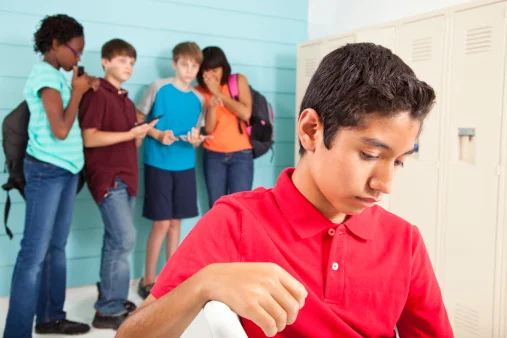+1 845 259 2974 (11 a.m to 7 p.m CST)
Bullied Parents – How to Be Better with Your Kids?

So, have you been bullied in the past? Should that change how you treat your kids when they are being bullied? Not at all. You need to be the parent who stands up for their kids and help them be confident so that they cannot go through the pain that you felt in the past. It is time to be smart parents to your kids so that they can do better.
Bullying is a serious issue that affects many children, impacting their mental health, academic performance, and overall well-being. It can take various forms, including physical aggression, verbal harassment, and the increasingly prevalent cyberbullying. The effects of being bullied can be long-lasting, leading to fear, anxiety, depression, and even physical harm. Parents play a crucial role in preventing and addressing these issues.
By staying informed and engaged, parents can spot signs of bullying early and intervene effectively. This involves setting up a safe environment at home, encouraging open communication, monitoring your kids and collaborating with educators to ensure children feel protected both at school and online.
Understanding Bullying
Bullying can manifest in multiple forms, each with its specific characteristics and signs. Recognizing these can help parents intervene effectively.
- Physical Bullying: This involves physical aggression like hitting, kicking, or pushing. It's the most visible form of bullying and can lead to physical injuries.
- Verbal Bullying: Includes name-calling, insults, and threats. Though less visible than physical bullying, it can deeply affect a child's self-esteem and emotional well-being.
- Cyberbullying: Occurs online or through digital platforms. It includes sending hurtful texts, emails, or posts about someone. This form can be particularly damaging due to its anonymity and wide reach.
Signs Your Child Might Be Experiencing Bullying:
- Changes in mood, behavior, or sleep patterns.
- Unexplained injuries or complaints of feeling unwell.
- Lost or damaged belongings.
- Avoidance of social situations or school.
- Declining grades or loss of interest in schoolwork.
Parents should look for these signs and take them seriously, as they are indicators that their child might be facing bullying.
The Importance of Parental Monitoring
Parental monitoring is a crucial aspect of modern parenting that plays a vital role in protecting children from bullying and other negative influences, especially in the digital age. Keeping an eye on your child's social interactions and online presence can help prevent issues before they escalate, and ensures children are using the internet safely and responsibly.
Tools and Techniques for Monitoring:
- Parental Control Software: Utilize tools to monitor internet usage, control access to inappropriate content, and track social media activities.
- Regular Check-ins: Keep communication open by regularly discussing online experiences and the people they interact with online and offline.
- Fostering Trust: It’s important to balance monitoring with respecting your child’s privacy. This encourages trust and open communication.
- Discuss the Reasons: Explain why monitoring is necessary, focusing on safety and the importance of being aware of online activities.
Effective parental monitoring helps create a secure environment for children to explore and interact while ensuring they remain protected from potential harm. This proactive approach not only safeguards them from the dangers of bullying but also instills responsible behavior and critical thinking about online interactions.
Building Your Child’s Resilience
Resilience is key to helping children navigate the challenges of bullying and other adversities. By building resilience, parents can empower their children to recover from setbacks and thrive despite difficult situations. Here are effective techniques to foster resilience and encourage positive social interactions:
Techniques to Build Self-Esteem and Assertiveness:
- Celebrate your child’s successes and strengths regularly to build their self-esteem.
- Teach children assertive communication techniques, helping them express their needs and boundaries clearly and respectfully.
- Encourage your child to participate in social activities that enhance interaction skills and build friendships.
- Guide them towards environments and peer groups that positively influence their behavior and attitudes.
Building resilience is a proactive approach to parenting that not only prepares children to deal with being bullied but also enhances their overall emotional and psychological well-being. By cultivating these skills, parents can ensure their children are equipped to handle life's challenges with confidence and poise.
What to Do If Your Child Is Bullied
Discovering that your child is being bullied can be deeply troubling. Here’s a practical guide on how to respond effectively to ensure their safety and address the issue constructively.
Steps to Take If Your Child Reports Being Bullied:
- Listen Carefully: Give your child your full attention without interruption, showing them that their concerns are taken seriously.
- Offer Reassurance: Confirm that they are not at fault, reassure them of your support, and praise their courage for speaking up.
- Document the Incidents: Record details of the bullying events, including times, places, and what occurred, as this information is crucial for any formal complaints.
- Contact School Officials: Immediately inform teachers, school counselors, or administrators about the bullying. Provide them with documented incidents to help them take appropriate action.
- Develop a Plan: Collaborate with school staff to create a plan that ensures your child's safety and addresses bullying. Regular follow-ups with the school are essential to monitor progress.
- Engage with Other Parents: If appropriate, consider discussing the matter with the parents of the children involved. This should be done carefully and ideally in coordination with school officials to ensure it is constructive.
Taking these steps can help manage the situation effectively, providing your child with the necessary support and working towards a resolution that stops bullying and restores your child’s sense of safety and well-being.
Addressing and preventing bullying is a critical responsibility for parents. By understanding the various forms of bullying and recognizing the signs, parents can intervene effectively to protect their children. Implementing strategies for effective parenting, fostering open communication, and monitoring online activities are essential steps in creating a safe and supportive environment.
Building your child's resilience through self-esteem, assertiveness, and positive social interactions equips them with the tools they need to navigate challenges confidently. Additionally, collaborating with schools and other parents ensures a community-wide approach to combating bullying. With these proactive measures, parents can significantly reduce the impact of bullying and help their children lead happier, healthier lives.























